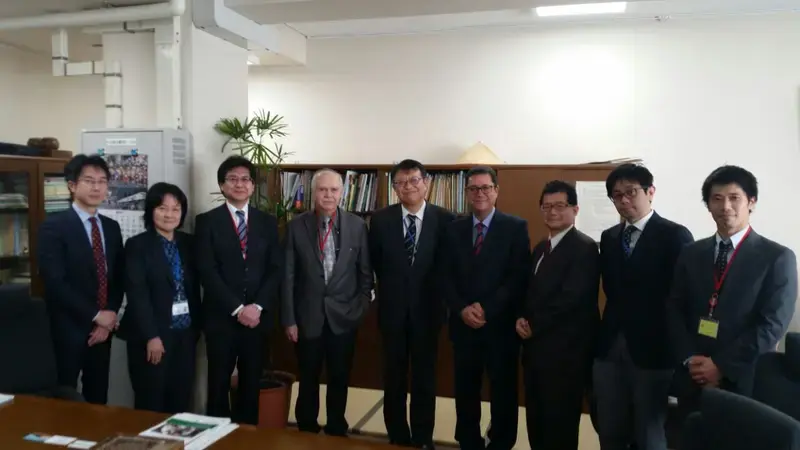Strengthening partnerships in Japan

ICARDA’s visit to Japan signals growing partnerships with the country’s government agencies and agricultural research community.
ICARDA’s Director General, Aly Abousabaa, participated in a series of strategic meetings and events in Tokyo in early February with the aim to strengthen long-standing partnerships with Japanese officials and the country’s agricultural research for development community.
Proposing solutions to dryland challenges
The visit was planned around a major international conference at Tottori University on February 7 – the Tokyo International Symposium – which was jointly organized by the Ministry of Environment, the United Nations Convention to Combat Desertification (UNCCD) and Tattori University, where participants discussed the policies, research and international cooperation required to reverse global land degradation.
As part of a high-level panel discussion, Mr. Abousabaa spoke about the critical role science and technology can play in sustainable agricultural production systems. His presentation discussed the main challenges facing dryland countries, and he offered a range of practical and cost-effective innovations that dryland countries can adopt to raise their productivity and enhance food security – from raised-bed and supplemental irrigation to more resilient crops and improved water-harvesting using laser-guided contouring.
To view the presentation click here.
Dialogues with high-level decision makers
Dialogues with high level decision makers from Japan’s International Cooperation Agency (JICA) followed. JICA is a strategic and long-term partner committed to the promotion of better livelihoods and equitable economic growth through human resource and capacity development. Exchange meetings were held with Mr. Kunihiro Yamauchi, the Director General of the Agency’s Global Environment Department, and Mr. Hiroto Mitsugi, Director General of JICA’s Rural Development Department.
These meetings provided an opportunity to build upon an ICARDA-JICA partnership going back several decades. JICA has previously provided financial and technical assistance to ICARDA, managing a research project to strengthen sheep milk production in Syria and contributing to the Center’s Geographic Information Systems (GIS) and remote-sensing laboratory.
More recently, an ICARDA-JICA partnership has run training programs in Iraq (since 2005) and Afghanistan (since 2002) to assist each country’s post-conflict transition. Over 1050 trainees have benefited from workshops, on a range of topics, such as: biotechnology application, water management, rainfed agriculture, salinity management, and cereal and legume crop improvement. Between 2011 and 2014, JICA also provided technical support to Iraq’s Kurdish Regional Government, improving the region’s wheat productivity.
Unlocking new investments in agricultural research
A meeting with Dr. Masa Iwanaga, President of Japan’s International Research Center for Agricultural Sciences (JIRCAS), explored opportunities to unlock new investments in agricultural research for development.
JIRCAS funds research on agriculture, forestry, and fisheries across the developing world, and has supported several ICARDA initiatives in the past: the improvement of native pastures and rangelands, the enhanced nutrition and management of small ruminants, technical support to the Center’s biotechnology research program, and research to assess the value of drought-resistant genes in food legumes.
A subsequent meeting was also held with Dr. Masamichi Saigo, Director General for Technological Affairs, within the Minister's Secretariat of the Ministry of Agriculture, Forestry and Fisheries of Japan (MAFF).
Committing to next generation science
Another area of discussion was the capacity strengthening of young agricultural scientists. The Japan International Award for Young Agricultural Researchers awards outstanding young agricultural researchers working in developing countries, and in 2015 Dr. Atef Swelam, Senior Scientist at ICARDA, received the award in recognition of his work developing a cost-effective raised-bed machine for small-scale farms in the Nile Delta. This year, ICARDA will also receive several MSc students involved in a Joint Master’s Degree program on integrated dryland management, coordinated by the Tokyo-based United Nations University.
Committing to further collaboration in the years ahead, ICARDA signed an extension to its Memorandum of Understanding with Tattori University at a ceremony attended by Dr. Ryota Teshima, President of Tottori University. Future partnerships will bring new country training programs, research projects, development studies, technical research disseminations, and project evaluations. In March, ICARDA will also participate in a JICA meeting in Dakar – offering practical solutions that policy makers and development partners can use to strengthen resilience against climate change across the Sahel and Horn of Africa.
